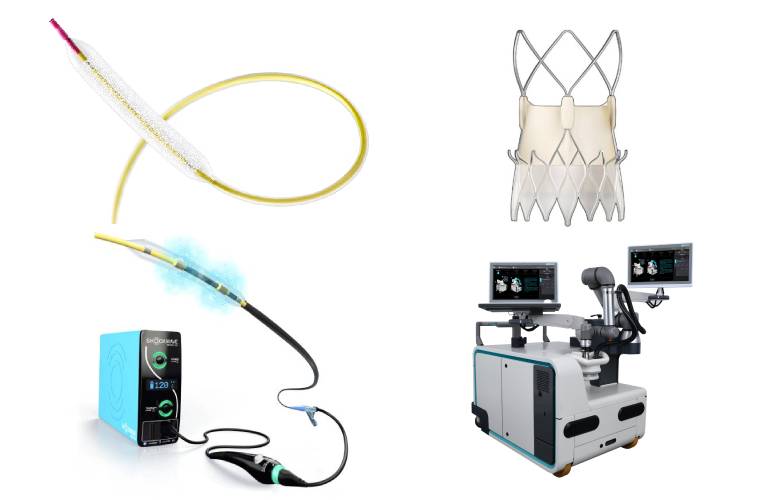
This week, a number of companies, big and small, shared updates on their cardiovascular technology innovations at EuroPCR 2025 in Paris.
The latest edition of EuroPCR delivered updates on technologies like intravascular lithotripsy (IVL), replacement heart valves, drug-eluting stents and many, many more innovative offerings.
Usual suspects in the cardiovascular space like Edwards, Johnson & Johnson, Medtronic, and Boston Scientific shared updates. Meanwhile, innovators like Meril, Elixir Medical and more provided their own clinical findings supporting their technologies, too.
Here are the biggest stories out of EuroPCR 2025:
J&J’s Shockwave has more data supporting its IVL tech
Johnson & Johnson MedTech‘s Shockwave Medical unit shared study results highlighting the use of its IVL treatment in female patients at EuroPCR 2025.

Shockwave announced 30-day primary endpoint results from the EMPOWER CAD study of its intravascular lithotripsy (IVL) therapy. It marks the first prospective, real-world percutaneous coronary intervention (PCI) study in female patients with complex, calcified coronary artery disease.
The investigators designed EMPOWER CAD to evaluate real-world outcomes in female patients with severely calcified coronary lesions. Subjects underwent an IVL-first treatment strategy, with findings confirming positive results from previous studies, the company said. The study showed similar safety and effectiveness outcomes across both men and women.
Favorable results confirm the results of an early retrospective analysis demonstrating the benefits of coronary IVL in female patients.
Data backs Boston Scientific Acurate Prime TAVI

Boston Scientific at EuroPCR 2025 shared real-world clinical data backing its Acurate Prime aortic valve system.
Results came from the first large, real-world clinical data on the company’s latest TAVI device following its European approval and launch last year.
Marlborough, Massachusetts-based Boston Scientific designed Acurate Prime to build upon the clinical performance of the Acurate neo2 platform. It has additional valve sizes to expand the treatment range to patients with a larger anatomy.
Investigators shared findings from 517 patients across 12 European sites. Outcomes included high rates of technical success (98.6%) and 30-day device success (96.4%). Overall, new permanent pacemaker (PPI) rates landed in the single digits at 9.8%.
Edwards highlights cost savings, improved outcomes through early interventions

New economic and clinical evidence shared by Edwards Lifesciences at EuroPCR 2025 further contributed to the company’s extensive body of research on severe aortic stenosis (AS).
Findings from the real-world study of more than 24,000 patients demonstrated that intervening on the disease before symptoms develop reduces the economic and resource burden on the healthcare system and improves patient outcomes.
Prompt intervention for severe AS patients before symptoms developed resulted in significantly lower healthcare costs at one year. Edwards said costs registered at $36,000 less per patient. They also reported shorter stay lengths during treatment (2.2 fewer days). Patients had fewer follow-up heart failure hospitalizations one year after treatment, too (80% less).
Data reinforced the value of early referral and evaluation demonstrated by Edwards’ EARLY TAVR trial results shared in March.
Medtronic reports positive drug-coated balloon data to accompany regulatory nod

At EuroPCR 2025, Medtronic had positive data for its Prevail paclitaxel-coated balloon catheter, which also received expanded CE mark approval.
The expanded indications for the paclitaxel-coated percutaneous transluminal coronary angioplasty (PTCA) balloon catheter (or drug-coated balloon/DCB) cover the treatment of coronary artery disease (CAD). According to the medtech giant, Prevail now has the broadest range of CE mark indications, including bifurcation.
Medtronic says the expanded label makes Prevail the only DCB indicated for treatment in patients with multivessel disease, acute coronary syndrome and diabetes.
Medtronic said that, in bifurcation lesions, Prevail demonstrated low mortality and revascularization rates. At one year, investigators reported 2.3% new myocardial infarction, 2.8% target lesion revascularization and 0% target lesion definite thrombosis.
Meril study supports heart valve replacement tech
Meril Life Sciences reported the presentation of findings from its LANDMARK trial at EuroPCR 2025.
LANDMARK is the first randomized non-inferiority trial comparing the balloon-expandable Myval transcatheter heart valve (THV) with other contemporary valves — Edwards’ balloon-expandable Sapien series and Medtronic’s self-expandable Evolut series in patients. The study evaluated the valves head-to-head in patients with symptomatic severe aortic stenosis.
The India-based company said the first-of-its-kind head-to-head trial reinforced the performance and safety of the next-generation Myval THV series. Myval demonstrated non-inferiority to contemporary THVs in terms of the one-year clinical efficacy composite endpoint.
Additionally, Meril said Myval delivered comparable outcomes when combining clinical efficacy with quality of life.
First-in-human results back TriCares tricuspid valve

TriCares this week reported results from a first-in-human trial supporting its Topaz transcatheter tricuspid valve replacement (TTVR) system.
The German medtech company designed Topaz to help patients with severe tricuspid regurgitation (TR) without needing open-heart surgery. It has a unique dual-stent design and two valve sizes that fit into a low-profile catheter system. The catheter system goes through the femoral vein and transports the prosthesis into the right half of the heart. There, it is released to replace a diseased tricuspid valve.
At EuroPCR 2025, Dr. Julien Dreyfus shared 30-day post-procedural data from 20 TR patients treated with Topaz across eight European centers.
The TRICURE study demonstrated significant TR elimination in treated patients. TriCares said the early clinical results compare favorably with existing TTVR treatment approaches.
Elixir Medical’s bioadaptor performs well against standard of care

Three-year results from a large randomized controlled trial presented at EuroPCR 2025 supported the use of the Elixir Medical DynamX coronary bioadaptor system.
The 445-patient BIOADAPTOR trial compares DynamX to the standard of care Medtronic Resolute Onyx drug-eluting stent (DES). Findings shared in Paris complement positive outcomes reported last fall.
Results demonstrated very low adverse events and durability of clinical outcomes with DynamX in target lesion failure (TLF) and cardiovascular death (CVD) compared to non-plateauing increase in adverse events in the DES arm.
Additionally, the study showed significatly lower TLF rates in left anterior descending (LAD) artery lesions (2.7% vs. 10.6%). This proves consistent with the bioadaptor mechanism of action of restoring vessel function.
Cardiawave reports positive one-year ultrasound therapy results

Cardiawave shared positive 12-month results from a study evaluating its Valvosoft non-invasive ultrasound therapy (NIUT) device.
The France-based medtech company designed Valvosoft for the treatment of severe symptomatic aortic stenosis (sSAS). It aims to non-invasively restore leaflet mobility in a stenotic aortic valve. It widens the valve opening to relieve the patient’s heart failure symptoms.
High-intensity focused ultrasound waves micro-fracture calcification embedded in aortic valve leaflets without damaging tissue.
Following two first-in-human studies and a multicenter pivotal study, the treatment has demonstrated feasibility, safety and efficacy. At one year post-treatment, investigators saw durable clinical benefits, including improved cardiac function and enhanced quality of life.













